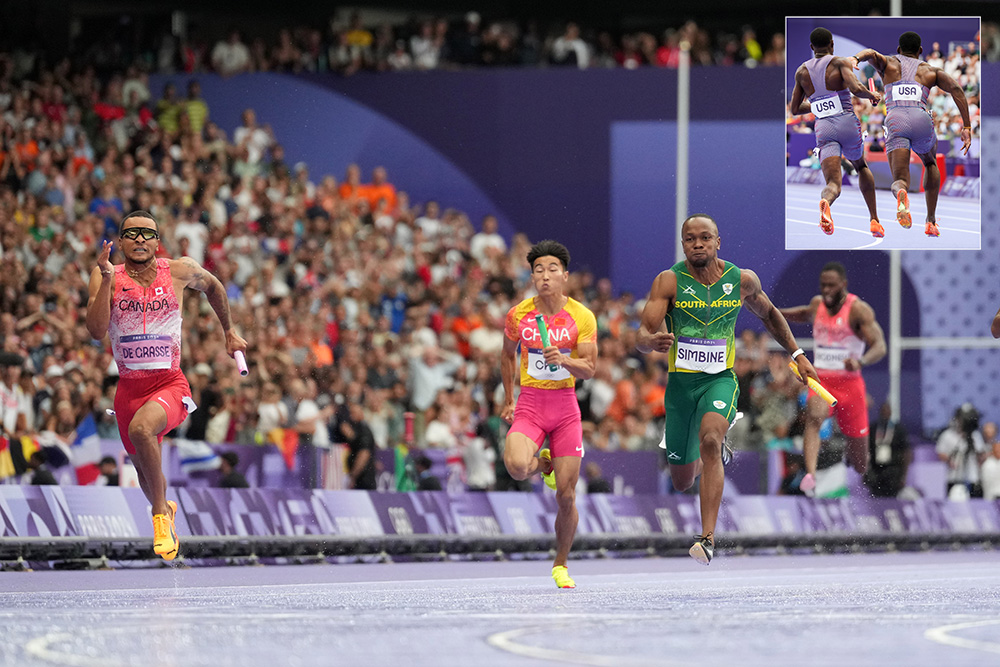
TO PARAPHRASE TOLSTOY, every unhappy relay is unhappy in its own way. This Olympics, we have two distinct threads in the 4 x 100, a happy one, starring Canada, and a very unhappy one, featuring another star-crossed quartet from the United States.
The Canadian thread is easy to tell: a sharp team put together three solid handoffs and grabbed gold in 37.50 in an exciting and close race. The U.S. thread is a bit more complicated: U.S. coaches took a team that ran a world-leading 37.47 in the heats, made a substitution, changed the order, and ended up with a DQ in the first 10 seconds or so of the final.
For both threads we’ll start with the heats. The first was remarkably fast. The U.S. team of Christian Coleman, Fred Kerley, Kyree King and Courtney Lindsey dominated in 37.47, a time just 0.08 short of the fastest heat ever despite an ugly handoff from Coleman to Kerley. South Africa followed in 37.94, then Britain in 38.04. Japan and Italy got the two time qualifiers. In the second, the Chinese won in 38.24, topping France (38.34) and Canada (38.39). The Canadians cut it close with a margin of just 0.06 over Jamaica to grab the last qualifying spot. Both Australia and Nigeria from heat 1 had run faster than China but did not make the final.
U.S. coaches had expected Noah Lyles to join the team for the final, along with Kenny Bednarek. However, after Lyles’ 200 finish and Covid announcement, they went with plan B. They chose to put Bednarek on the second leg, moving Kerley to the anchor, meaning that every exchange combination would be different than in the heats.
The rain ended before the race, though the track remained very wet. At the gun Coleman got out like lightning. His split of 9.86 is the fastest-ever leadoff, measured by the chip inside the baton. The French were a half-second behind, and the Canadian leadoff, Aaron Brown, recorded a 10.43.
That is also where the thread unraveled for the Americans. Bednarek, the 200 silver medalist, left too early and Coleman could not catch him in time. Bednarek slammed on the brakes too late, Coleman ran into his back, and the stick changed hands out of the zone.
On the backstretch, Japan, Italy and France led, with Canada’s Jerome Black bringing his team up to 4th with an 8.98 split. Far behind, Bednarek split just a 9.93 before his handoff to Kyree King.
Japan’s precision passing kept them in the lead on the turn, Italy in 2nd and Brendon Rodney moving Canada to 3rd with a 9.20 before his handoff to Andre De Grasse. The veteran sprinter ran down both Japan and Italy in 8.89 while staying ahead of South Africa’s Akani Simbine and Britain’s Zharnel Hughes, both clocked at 8.78.
With its 37.50, Canada took the gold it last won in ’96. South Africa, with a 37.57 African Record, won its first medal in the event, and Great Britain won silver, its first medal since its ’04 gold, in 37.61.
The U.S. — not that it mattered anymore — had another poor exchange and Fred Kerley ran 8.79 for what was originally tabbed as a 7th place in 37.89 before the DQ came down.
It has now been 20 years since the reigning world champions have made the Olympic podium, and 24 since they won gold. Acting as U.S. spokesman, Coleman kept repeating, “We just didn’t get it done today.”
Meanwhile, Canada celebrated. Said De Grasse, “It feels pretty amazing. To be out with these guys, my brothers, I’ve been with them since the beginning of time, so it’s amazing. We talked about this moment for years. It feels good to bring it to fruition.”
MEN’S 4×1 RESULTS
FINAL (August 09)
(temperature 72F/22C; humidity 88%)
1. Canada 37.50
(Aaron Brown 10.43, Jerome Blake 8.98, Brendon Rodney 9.20, Andre De Grasse 8.89);
2. South Africa 37.57 NR (#7 nation)
(Bayanda Walaza 10.41, Shaun Maswanganyi 9.06, Bradley Nkoana 9.32, Akani Simbine 8.78);
3. Great Britain 37.61
(Jeremiah Azu 10.51, Louie Hinchliffe 9.03, Nethaneel Mitchell-Blake 9.29, Zharnel Hughes 8.78);
4. Italy 37.68
(Matteo Melluzzo 10.40, Lamont Marcell Jacobs 8.96, Lorenzo Patta 9.12, Filippo Tortu 9.20);
5. Japan 37.78
(Ryuichiro Sakai 10.41, Abdul Hakim Sani Brown 8.88, Yoshihide Kiryu 9.16, Koki Ueyama 9.33);
6. France 37.81
(Mickael-Méba Zeze 10.36, Jeff Erius 9.00, Ryan Zeze 9.41, Pablo Mateo 9.04);
7. China 38.06
(Zhijian Deng 10.55, Zhenye Xie 9.01, Haibin Yan 9.44, Jiapeng Chen 9.06);
… dq—United States 37.89
(Christian Coleman 9.86 [zone] Kenny Bednarek 9.93, Kyree King 9.31, Fred Kerley 8.79).
(best-ever mark-for-place: 4, 6–7)
(lanes: 2. Italy; 3. Japan; 4. Great Britain; 5. United States; 6. France; 7. South Africa; 8. China; 9. Canada)
(reaction times: 0.130 Japan, 0.138 United States, 0.142 Italy, 0.153 South Africa & France, 0.155 Canada, 0.160 China, 0.162 Great Britain)
HEATS (August 08)
I–1. United States 37.47 (Coleman, Kerley, King, Courtney Lindsey); 2. South Africa 37.94; 3. Great Britain 38.04 (Azu, Hinchliffe, Richard Kilty, Mitchell-Blake); 4. Japan 38.06 (Sani Brown, Hiroki Yanagita, Kiryu, Ueyama); 5. Italy 38.07 (Melluzzo, Jacobs, Eseosa Desalu, Tortu); 6. Australia 38.12 NR (Lachlan Kennedy, Jacob Despard, Calab Law, Joshua Azzopardi); 7. Nigeria 38.20 (Favour Ashe, Kayinsola Ajayi, Alaba Akintola, Usheoritse Itsekiri); 8. Netherlands 38.48 (Onyema Adigida, Taymir Burnet, Nsikak Ekpo, Elvis Afrifa).
II–1. China 38.24; 2. France 38.34; 3. Canada 38.39; 4. Jamaica 38.45 (Ackeem Blake, Jelani Walker, Jehlani Gordon, Kishane Thompson); 5. Germany 38.53 (Kevin Kranz, Owen Ansah, Yannick Wolf, Lucas Ansah-Peprah); 6. Brazil 38.73 (Gabriel Dos Santos, Felipe Bardi, Erik Felipe Cardoso, Renan Correa); 7. Liberia 38.97 (Jabez Reeves, Emmanuel Matadi, John Sherman, Joe Fahnbulleh);… dq—Ghana.